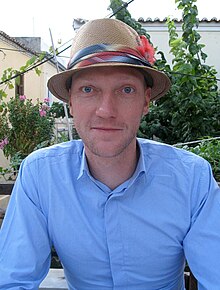Mark Champkins

This article includes a list of references, related reading, or external links, but its sources remain unclear because it lacks inline citations. |
Mark Champkins (born 25 April 1977), is a UK designer and inventor who gained public recognition after successfully participating in the BBC television show Dragons' Den.
Background
Champkins studied Manufacturing Engineering (MET g.2000) at the University of Cambridge, and Industrial Design Engineering at the Royal College of Art (RCA g.2002) in London.
Whilst at the RCA Champkins designed a range of Self-Heating Crockery making use of the Phase Change Material Sodium Acetate Trihydrate (SAT). The crockery enable users to instantaneously heat plates, cups and bowls to sixty degrees celcius by pushing a button that started a phase change reaction withing the crockery. The items could be recharged and reused by washing them in hot water or a dishwasher.
In 2002, the crockery design was Awarded British Invention of the Year and featured on a number of TV science programs such as BBC Television's Tomorrow's World, the Discovery Channels' 'Whats the Big Idea' section, and the CNN News.
After Graduating from the RCA, Champkins worked at The Helen Hamlyn Research Centre (HHRC) as part of a twelve month research project to investigate how good school design can improve standards of education in the UK.
In 2004, Champkins won a business Award from NESTA (National Endowment for Science Technology and the Arts) and founded Concentrate Design, a company that develops products to help pupils to concentrate at school children.
In 2007, on the Dragons Den, Champkins won investment of £100,000 from Peter Jones (entrepreneur) in return for a 40% stake in his business.
In 2008 the company released a number of tongue-in-cheek products including a Voting Ruler, (with which pupils can vote 'yes' or 'no' by holding the appropriate end, the Mugs of Authority and packs of Pre-chewed Pencils.
The Pre-chewed Pencils caught the attention of many bloggers, leading to an appearance on Chris Evans BBC Radio 2 drive time show to explain the invention.[1]
The company was also responsible for design input to Joshua Silver's Adaptive Spectacles and Imperial College's Body Sensing Network, both of which promote well-being and education.[2]
